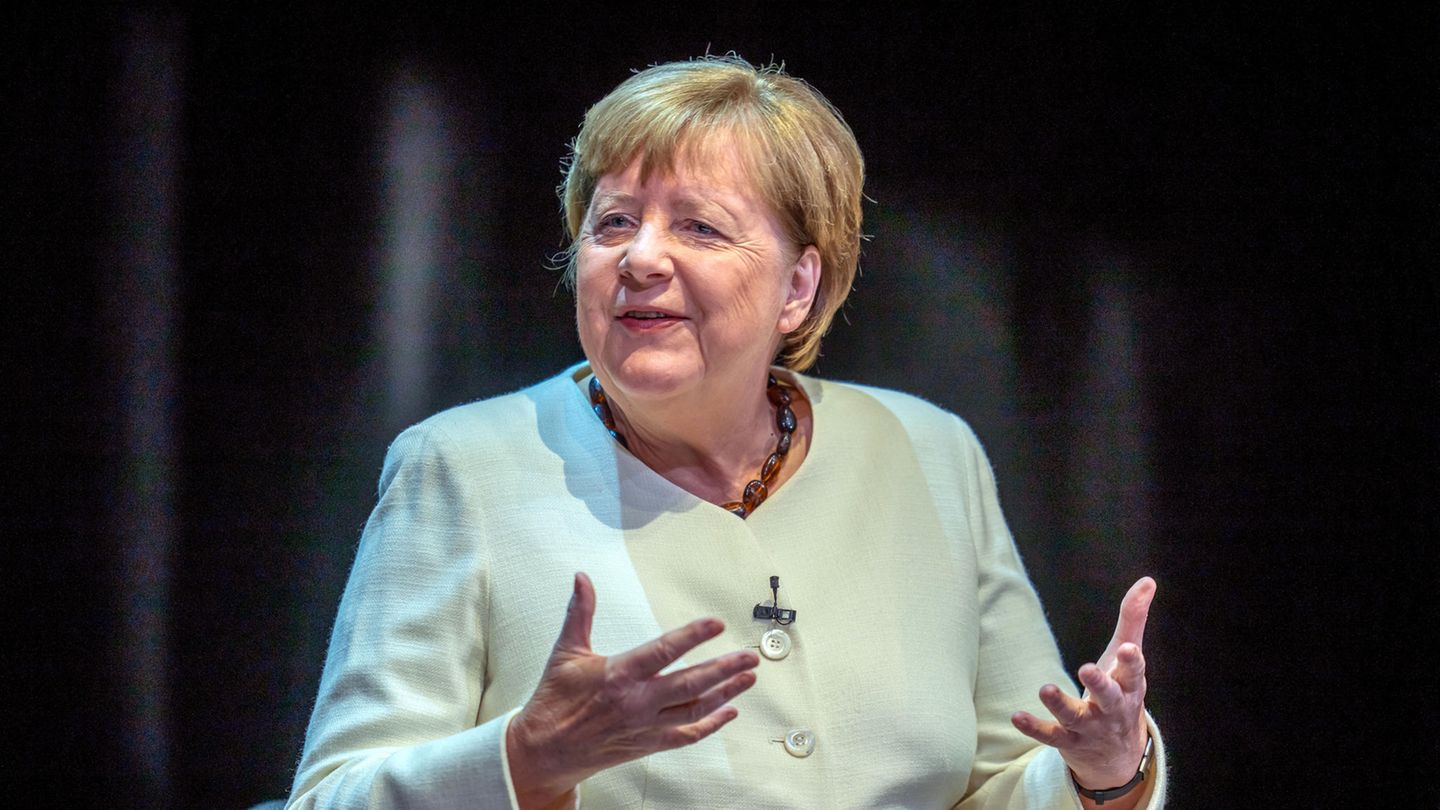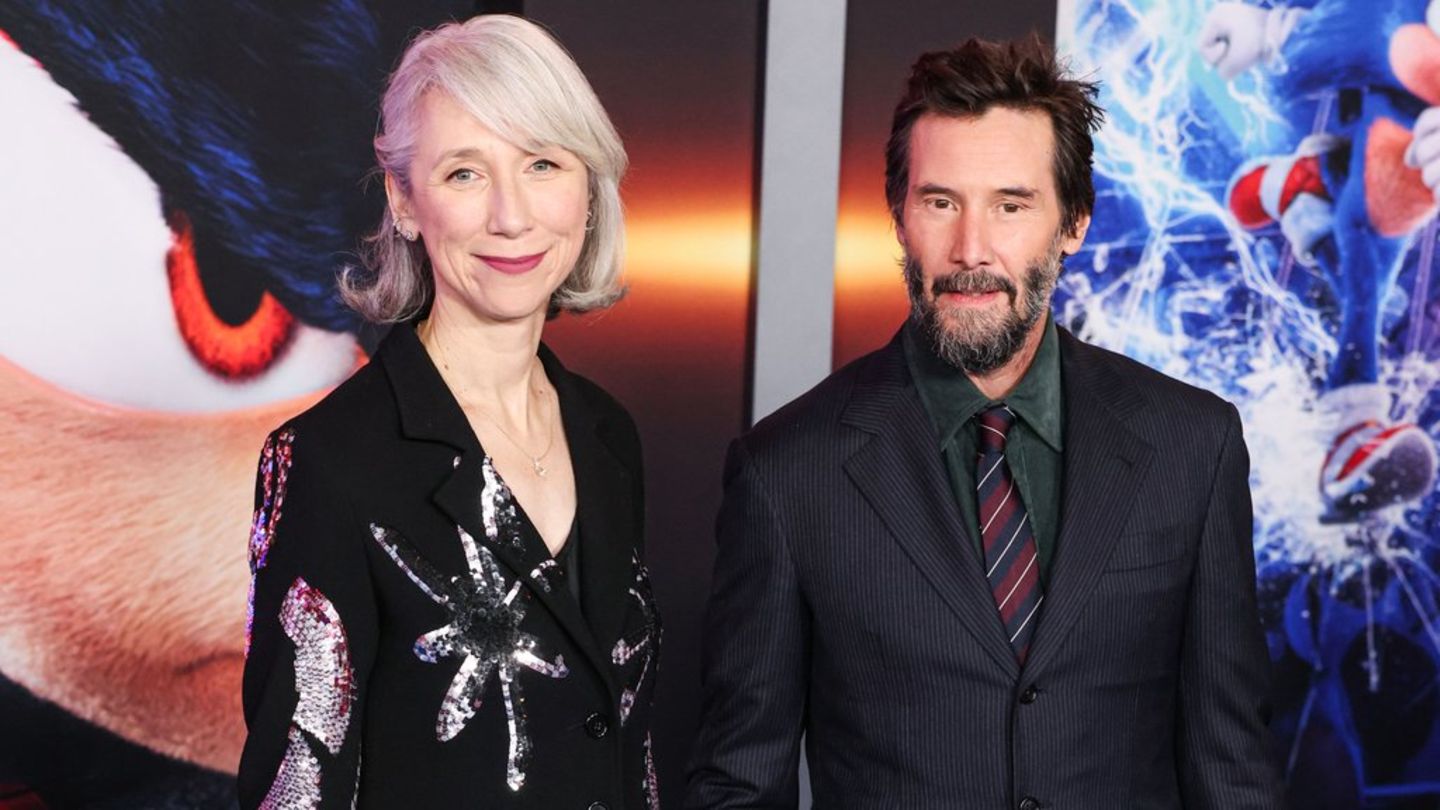On site
At the book launch, the ex-Chancellor unpacks
Copy the current link
Angela Merkel presents her memoirs. The ex-Chancellor is defending herself against criticism of her legacy – and for the first time is also dishing it out against some of her critics.
Is it coming out of her now? Throughout the evening, Angela Merkel answered every objection in a friendly manner. She answered each of Anne Will’s sometimes somewhat complicated questions calmly and in a good mood. But when the recording device shows an hour and twelve minutes, the pleasant mood in Merkel’s imagination gives way to a certain heat. After having to listen to all sorts of things about what she is said to have done wrong, she says with a certain verve in her voice: “I might as well unpack now.” It sounds like a threat. Let’s see what’s coming.
Book launch at the Deutsches Theater Berlin on Tuesday evening. Sounds a bit small. It is the world premiere for the memories of the former Chancellor. A larger-than-life image of the book title “Freedom” hangs above the stage. And underneath sits the pensioner Merkel, who hardly differs from Chancellor Merkel in her entire appearance. In the audience, companions like the long-time Union parliamentary group leader Volker Kauder are listening. Ulrich Wilhelm and Thomas Steg, who a candidate on “Who Wants to Be a Millionaire” once thought were the Kastelruther Spatzen but who were Merkel’s government spokesman, sit side by side in harmony. Class reunion. Merkel’s husband Joachim Sauer, who was extremely public-shy as chancellor’s husband, is also there. He wears an FFP2 mask.
Angela Merkel and Anne Will – an experienced talk duo
Anne Will and Angela Merkel have known each other for a long time. The Chancellor usually went to Will’s talk show when she wanted to explain herself on television in crisis situations, especially in times of the refugee crisis. And it’s a bit like that again now. Merkel has written a book about her life and her work in politics, and there are complaints everywhere that she is avoiding criticism: of her Russia policy, of her energy transition, of her responsibility for the poor condition of the Bundeswehr, the bridges, the railways and so on of digitalization. So she talks to Anne Will about it.
That means she will talk to her about it later, because Will starts at the beginning, in Merkel’s childhood and youth, and soon comes to the episode when Angela Merkel, then Angela Kasner, fell drunk into a “quarry pond” after graduating from high school . It was a “lake created in the Ice Age,” Merkel immediately corrects. It’s just a small thing, but it’s a typical Merkel moment. First: She takes it seriously. Second: She formulates like a physicist, not like a writer. Third: Her dry intervention triggers laughter in the audience, which irritates Merkel. She has wit. But sometimes she’s the joke too.
How Angela Merkel came into the “Tagesschau” cabinet for the first time
Angela Merkel can tell stories in a very entertaining way: Anecdotally, when she remembers her first cabinet meeting with all the West German men around Helmut Kohl, whom she only knew from the “Tagesschau” until then. Personally, when she talks about Wolfgang Schäuble, who was always clear and, when he deemed it necessary, warning statements, while she comes more from the confident “We can do it” tone. It’s funny when she dismisses some of the disparagement that was directed at her East German origins by saying that at least it was enough to be Chancellor for 16 years. All of this is particularly noticeable this evening because her book is written in a much drier way. The best way to get the most out of Merkel’s memoir is to listen to the interviews she gave around the time of its publication. There is simply more meat on the bones of their reports.
This also applies at the end, when Anne Will confronts her with criticism and asks about mistakes. Merkel counters that she never claimed to have left the country in “tip-top condition.” When it comes to climate protection, she didn’t get as far as she had imagined. And it also failed in its attempt to stop Russian President Vladimir Putin from committing aggression against Ukraine. There are concessions with which she responds to the criticism: “I’m exposing myself,” Merkel says at one point.
Merkel’s attitude: Deficits yes, mistakes no
The longer you listen, the clearer Merkel’s attitude becomes: she admits that she hasn’t accomplished some things. But she refuses to see it as a personal fault. “If it helps, you should say: Merkel did it,” says Merkel. She argues from the time in which she made decisions. Just to live up to expectations, she won’t look back and act as if the scales of what she did wrong are now falling from her eyes.
It is the time of their greatest upheaval. She feels that she is being treated unfairly, especially given the state of the Bundeswehr. Because it was the SPD and the Greens who always opposed the modernization of the armed forces, and certainly not the CDU. And it was the Greens who, through the Federal Council, always prevented some Balkan states from being declared safe countries of origin, which would have prevented some of the problems of today’s migration policy. “Then you can say that I didn’t get my way, OK,” says Merkel, who now speaks very quickly, “but I don’t think that’s okay to forget everything else.” And then she says the beautiful sentence: “I could unpack now,” and you look forward to it. But then she lets it go. “It doesn’t help.”
In her self-control, the pensioner Merkel is still a bit like Chancellor Merkel.
Source: Stern
I have been working in the news industry for over 6 years, first as a reporter and now as an editor. I have covered politics extensively, and my work has appeared in major newspapers and online news outlets around the world. In addition to my writing, I also contribute regularly to 24 Hours World.




